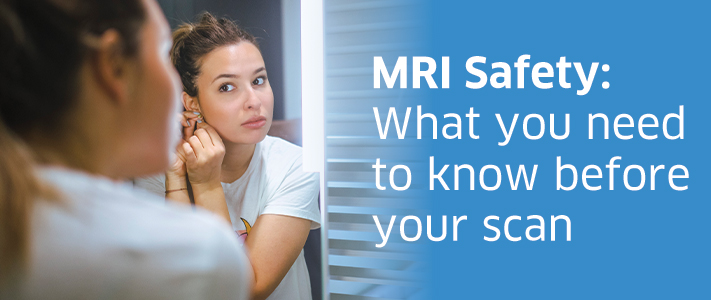Magnetic Resonance Imaging (MRI) is a revolutionary medical marvel that unveils the mysteries within your body using powerful magnetic fields and radiation waves. Let’s dive into the incredible world of MRIs while ensuring your safety for a truly amazing scanning experience!
- Magnetic attraction: The magnet is always on! Even the smallest metal items can be attracted to the MRI’s powerful magnet and go flying resulting in serious injury.
- Accessorize with caution: Don’t wear any clothing items with metal. There will be a cotton dressing gown available if needed. Remove any metallic jewelry or other items.
- Eat freely: You are free to eat, drink, and take medications as normal in preparation for your scan.
Unraveling the Safety Secrets
Contraindications are things that could interfere with the efficiency and safety of the MRI scan. If any of the following contraindications apply to you, an MRI scan may not be a safe option for you:
- Cardiac pacemaker
- Implanted cardiac defibrillator
- Internal pacing wires
- Clips such as cerebral, carotid, or aortic aneurysm
- Cochlear implants
- Any implant held in by a magnet
- Swan-Ganz catheter
There are other things that could affect the scan depending on the type of equipment and other situational factors. Talk to your radiologist and MRI technologist before your scan to see if the equipment is safe for you for any of the following:
- Ocular implants
- Any type of prosthesis (eye, limbs, heart valve, etc.)
- Joint replacement
- Metal rods or plates in body
- Metal or wire mesh implants
- Vascular access port of catheter
- Transdermal delivery system (Nitro)
- Vascular access port of catheter
- Metal removed from your eye
- Any metal fragments
- Shunt (spinal or intraventricular)
- Insulin or other drug infusion pump
- Neurostimulator/Bone growth or fusion stimulator
- Intravascular stents, filters, or coils
- Electrodes (on body, head, or brain)
- IUD or diaphragm
- Pregnant/possibly pregnant
At Expert MRI, we want you to have the best possible experience receiving an MRI. Please contact us at 877-MRI-8888 with any questions or concerns about your upcoming scan.
References
- Radiology Info, (July 15, 2023) MRI Safety. Retrieved on January 24, 2034, from https://www.radiologyinfo.org/en/info/safety-mr
- Children’s Hospital of Pittsburgh, Basic MRI Safety. Retrieved on January 24, 2034, from https://www.chp.edu/-/media/chp/about-us/documents/volunteer/mri-basics.pdf?la=en
- University of Iowa Health Care, Contraindications of the Research MRI Procedure. Retrieved on January 24, 2034, from https://medicine.uiowa.edu/mri/mri-safety/contraindications-research-mri-procedure#:~:text=Absolute%20Contraindications%3A,cerebral%2C%20carotid%2C%20or%20aortic%20aneurysm












